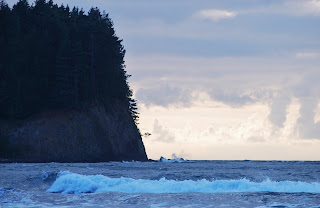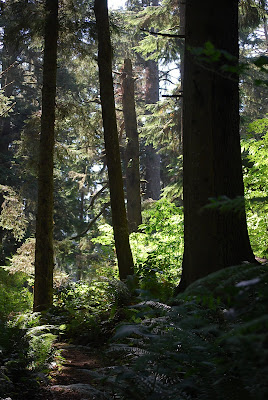Cover upper sands
Like an impressionist's wash
Of burnt sienna, green, and ochre
Interspersed with rusty Sheep Sorrel,
Blue Lupine and Vetch.
Beach Peas and Dunegrass
Line the sandy trail
Enticing, leading to wide expanse of beach,
Deserted, except for a few crows.
Farther off, gulls wade the creek,
Where it meets the waves,
Searching for morsels.
Crows leave tracks
Clearly defined in dark, wet sand
Showing where they've dug
To un-earth Sand Worms.
Then back to the woods.
We've never known why
For they creep in at dawn or dusk,
Perhaps for the taste of salt.
Once, a river otter was sighted
Bounding across the width of sand.
Seeing us, it scurried to the grass line,
Disappeared into thick reeds and brush.
Later, I found his run,
Followed it to marsh
And webbed prints in mud.
Smaller, zigzag tracks show
Where crab has run, to escape the sun
And smooth winding trails
Would be snails,Ending where they dug in to wait.
Receding, the tide leaves behind
Wet piles of Bull and Sugar Kelp,
Feather Boas and Eelgrass
Crawling with amphipods, beach hoppers,An occasional crab.
Waterlogged branches become stranded
Bearing their cargo
Of barnacles and sponges
Now left high and dry.
We follow the wrack line
Strewn with debris from the sea,
And all sorts of human endeavors.
Ahead, through the mist
Hovering above the flat stretch of sand
Two dark shapes emerge.
Large and wary,
One on a dark rock, one on a log,
As we approach they flee,
Circling far above
In ever-expanding spiral
Reluctant to leave,
Unwilling to return.
The rock's lumpy, rounded shape
Shows it to be a dead seal
Washed up some time ago,
Now mostly skin stretched over bones.The vultures had their turn,
Now Golden Eagle eats its fill,While two Bald Eagles
Watch from the trees.
The roar of waves competes
With roar of the wind,
And neither one wins.
But still they go on
In never-ending cycles
Like the sea's rising and falling.
And the race is on
To see who can survive
A minus tide.
Deep calls to deep
In the roar of your waterfalls;
all your waves and breakers
have swept over me.
Psalm 42:7
The sea is his, for he made it,
And his hands formed the dry land.
Psalm 95:5


















































